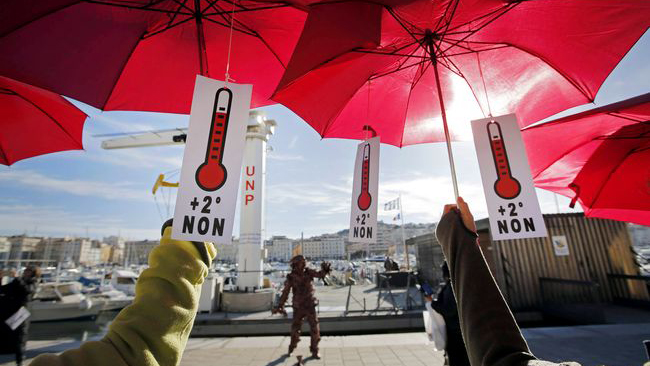“The meeting on the Seine”
The 21st Conference of Parties to the UN Framework Convention on Climate Change has started in Paris. What Ukraine plans to do to save the planet?
The COP21 summit in Paris has brought together heads of state and government from 147 countries, marking a rare occasion for political elites to pay so much attention to environment. President Petro Poroshenko represents Ukraine at the event. Let us recall that the COP21 will run from November 30 to December 11 in Le Bourget, a suburb of Paris. The main purpose of the conference is to get all its participants, that is, 195 countries and the EU, to sign an agreement that will limit the global warming to two degrees Celsius. The prospective agreement will replace the Kyoto Protocol. The meeting should also see a fund being created that will help third world countries to adapt to the climate change.
An event of this magnitude is a platform for negotiations between politicians from around the world. Thus, Poroshenko arrived in Paris on November 29 and met with Canadian Prime Minister Justin Trudeau on the same day. The parties discussed simplification of visa regime for Ukrainians and preparations for signing a bilateral free trade agreement. The president of Ukraine was to meet German Chancellor Angela Merkel and Turkish President Recep Tayyip Erdogan on November 30. Other scheduled meetings involved Petro Poroshenko and President of the European Council Donald Tusk and European Commission President Jean-Claude Juncker.
AMBIGUOUS POSITION OF UKRAINE
Negotiations on the new agreement will not be easy, and that is natural, since almost 200 countries are to decide how to limit some of their industries in order to reduce GHG emissions. During this “meeting on the Seine,” Europe, Asia, South and North Americas have, regardless of political differences, to agree for the sake of a common goal – to stop global warming, which threatens the ecological apocalypse. Participating nations were expected to send their Intended Nationally Determined Contributions by early fall 2015, which reveal their plans to reduce emissions. France reported that almost all participants of the COP21 provided their proposals.

REUTERS photo
The contribution of Ukraine looks rather contradictory. The document stipulates that Ukraine plans to not exceed 60 percent of greenhouse gas emissions of the base year (1990) by 2030. But according to independent analysts of the Climate Action Tracker group, in fact, the contribution of Ukraine foresees growth of greenhouse gas emissions between today and 2030 by 40 percent, since GHG emissions in Ukraine have decreased by 58 percent compared to 1990. We have overshot objectives set out in the submission.
ENVIRONMENTAL SOLIDARITY
On the eve of the conference, over 2,000 climate marches were held all over the world. These events involved people from more than 170 countries. The Paris climate march was canceled due to security measures instituted after the November 13 attacks. However, activists still took to the streets, and police dispersed them with tear gas and arrested more than 200 people. The information about the event is contradictory, though: The Guardian reports that these protesters focused not only on ecological component, but political one too, and some people were protesting primarily against capitalism.
In Ukraine, climate marches were held in Kyiv, Kharkiv, Zaporizhia, Kryvy Rih, Kherson, and Rivne. The Kyiv march made the list of the most important actions for climate protection measures, on par with London, Oslo, Berlin, Tokyo, and Washington events. It was held under the slogan “Change the system, not the climate!” The protesters demanded complete phase-out of fossil fuels and switch to renewable energy by 2050. The activists also advocated development of public transport and cycling infrastructure, introduction of European emission standards for enterprises and promotion of various energy saving measures.
After all, the treaty to be signed in Paris will not stop global warming by itself. Much more important are systematic practical steps for the transition to “green” economy and reduction of greenhouse gas emissions. We are seeing the beginnings of the fight for humanity’s fate, which will last for a long time.
Newspaper output №:
№71, (2015)Section
Economy





